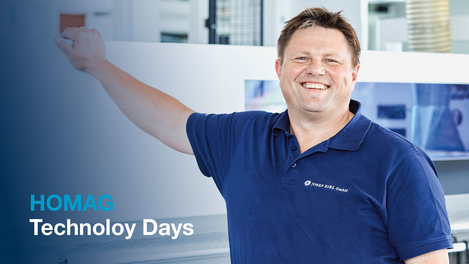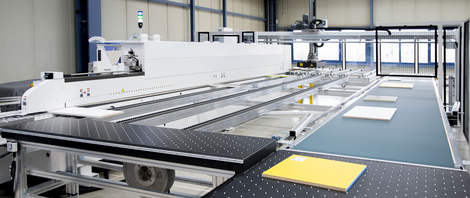Portrait of an employee: Klaus Fickler
What do you do at SCHULER Consulting and how long have you been there?
I joined SCHULER Consulting as a PPS consultant almost 26 years ago on July 1, 1994. My job involved implementing the LIGNOS system for new customers. For existing customers, we implemented new modules and optimized the existing system. The optimization was based on an analysis of the business processes. This analysis was then used to develop a new process which was programmed and implemented to suit the customer's specific needs, as required.
The diversity of variants in the furniture sector was constantly increasing. Around the turn of the century, a new product (COE) was developed and sold. From this point on, it was possible to fully describe the high diversity of variants in modern-day furniture. COE also enabled implementation of the entire business process — from the sales order right up to the machine. Today, large manufacturers of series furniture in the DACH region use this product.
Looking at the PPS and ERP systems, the number of industry-specific software packages constantly decreased. In parallel, software products specifically developed for a defined, special requirement emerged, such as software to support commercial sales or CAD/CAM products for object manufacturers. Around the turn of the century, the integrated software solution was created. Today, our customers work with a number of highly specialized software products that are networked via interfaces.
What does your work involve now?
In January 2015, I moved internally from the software division to the management consulting division. One of the main reasons for this was the development of companies in China. The initial trend there was to use machines to industrialize companies. Software was not thought to be very important and was considered "unnecessary." That has changed massively since the introduction of the Industry 4.0 strategy. Today, data models, data and software are essential for controlling machines in manufacturing. The trend for complete automation is in full swing.
In recent years, I've therefore spent a large part of my working time in China and southeast Asia (Taiwan, Vietnam, Malaysia, Australia, UAE, etc.). My experiences there, the different cultures, the rebirth of China as a global power — I wouldn't want to have missed any of that.
How did you arrive at this role?
After finishing my studies at Rosenheim Technical University of Applied Sciences, my first job involved implementing software. There I created the all the master data. It took one and a half years to produce the master data (items master, parts master, parts lists, work plans) for the cabinet and separating wall programs as well as three office furniture models. I also further developed the software based on daily requirements.
In my second job, I spent one year programming full time. I then moved to consulting, starting with the implementation of PPS software before continuing on toward the optimization of business processes. Finally, I arrived at SCHULER.
What do you like most about your work?
At SCHULER we work globally. In addition to the technical requirements of our projects, the cultural differences also have to be integrated in our work. What's more, the work is always done in a team as the far-reaching requirements of Industry 4.0, batch size 1 production and mass customization are increasingly becoming too much for one individual. A separate team is created for each customer project. The team is very motivated and is responsible for successful completion of the project.
There are new challenges every day — not just in terms of our work, but also in terms of travel, living in hotels and experiencing different cultures. All of these challenges have to be overcome.
How would you describe the collaboration between SCHULER and HOMAG?
I am frequently in contact with HOMAG employees for various projects — for example, when machines are due to be implemented, or when we're defining requirements on the data model for operating a machine automatically.
In the various projects, teams are often formed of both HOMAG and SCHULER employees, and they all value and respect each other's contributions to the successful installation and commissioning of machines.
Communication with our customers allows us to establish well in advance whether optimizations are coming up for a certain production area or whether procurement of corresponding machines and plants is required. That's where HOMAG comes in.
We also work together closely on the EKG studies, for example. These are commissioned by HOMAG and executed by SCHULER. For example, we check on HOMAG's behalf whether the customer is technically capable of providing data for the new system or whether something extra is required to do this.




